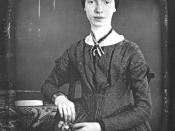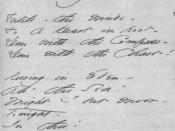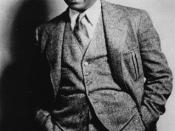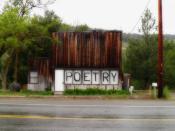In the poem "If We Must Die" by Claude McKay, the author cries out to his audience -to his men at arms- to fight back against those that oppress them and are intent to kill them. Though not as rich in poetic symbolism as the poems by Emily Dickinson and George Herbert, McKay's poem evokes a stronger and more inspiring emotional reaction. He achieves this through his rhyme and rhythm scheme, through alliteration and repetition, and through animal imagery. They shall be examined in reverse order.
The first two lines of McKay's poem, "If we must die, let it not be like hogs / Hunted and penned in an inglorious spot," establishes an animal theme, which is continued throughout the rest of the poem. McKay reaches out to the audience with intent to inspire them to action. The audience becomes a hunted animal. In lines three and four, "While round us bark the mad and hungry dogs, / Making their mock at our accursed lot," McKay portrays the adversary as a pack of wild dogs intent on killing the speaker and his "kinsmen."
His choice of words, specifically "mock," is particularly effective in drawing a reaction from the audience. The opponent is not only intent on killing them, but mocks them in the attempt. Lines five through eight turn the animal allusions a bit as McKay distinguished the differences between his kinsmen and their attackers. He repeats his cry that, "If we must die, O let us nobly die, / So that our precious blood may not be shed / in vain." His kinsmen are more than mere animals. They shall not be "penned in" and slaughtered like "hogs." They are noble men with "precious blood," blood which will not be spilt so easily. If McKay and his brothers are able to do just this, "then even the monsters (they) defy / Shall be constrained to honor (them) though dead!" Thus, even in the undeniable face of death, McKay gives hope to those around him. In lines 9 through 12, he calls them to arms against "the common foe" and cries that "though far outnumbered" they must show their bravery. The reader stands among McKay and his kinsmen as one who is about to die and feels the bond of that group strengthened by his words. For "their thousand blows" he asks that they but strike "one deathblow!" A deathblow that will most probably signify their own deaths. It is when the audience hears that they have nothing left for themselves but the "open grave," McKay's words make his listeners stronger than ever. Nothing fights harder than an animal backed into a corner with nowhere to goâ¦unless it is a man backed into the corner. And that is what McKay's words shout. We are men and "like men we'll face the murderous, cowardly pack." With these words, the transition from hunted hogs to brave and noble men is complete. Still though, the adversary is nothing more than a "cowardly pack" of "mad and hungry dogs." And McKay and his audience will face these animals, not "hunted and penned in an inglorious spot" but "pressed to the wall, dying, but fighting back!" Such words are strong enough to impassion most hearts, but the use of alliteration and repetition improves upon it.
In McKay's poem, alliteration is used about four times. Examples of this can be seen in lines 4, 9, and 11 in phrases like "making their mock," "must meet," and "deal one deathblow." If one continues down line 13 to 14 then "pack / Pressed" is also an example of alliteration. Repetition is used much less, though arguably more effectively, as when McKay repeats the call to his kinsmen, "If we must dieâ¦" and unifying his men in line 10 as he says "let us show us brave."
It is when examining the poem as a whole, however, that a person can see how McKay uses many of the same characteristics of a Shakespearean sonnet, and thus still follows a traditional theme. The rhyme scheme follows the traditional ABAB form with fourteen lines and there are five stressed syllables for each line. Despite this, however, iambic pentameter is not maintained throughout the entire poem and thus it is disqualified as a true Shakespearean sonnet. An example of iambic pentameter being followed can be seen in line 3 "While round us bark the mad and hungry dogs," and yet on the other hand, one can see a prime example of this pattern being broken in the last line, "Pressed to the wall, dying, but fighting back!" But forgetting all of that, this critic believes that the most interesting thing to notice, and to focus on, is the syllabic pattern. In general, it seemed that McKay was attempting to stick to ten syllables for each line, and at a glance it seems that he succeeded. On closer inspection, however, examples of excessive syllable usage can be found in both line two and line thirteen. A critic may find this odd since it is both the second and the second to the last line that most clearly stray from the ten syllable pattern. Instead they have eleven syllables. One could guess that McKay's reason for this is to establish a peak at the beginning of his poem in order to grab the emotion and attention of his audience. While the second to the last line is that last cry to fight, a crescendo that is meant to inspire his men. A critic might say this. However, another critic would be just as justified in saying that McKay was actually trying to follow the ten-syllable pattern and was (barely) able to squeeze it in. To see this, one must carefully examine both of the lines. Line 2, "Hunted and penned in an inglorious spot" sounds off like "hun-ted and penned in an in-glor-ri-us spot." Eleven syllables. Inglorious though can be easily squeezed into three rather than four syllables, such as in the pronunciation "in-glor-yus." As for line thirteen, "Like men we'll face the murderous cowardly pack," the reader runs into the same problem with the words murderous and cowardly. If a person wants to force it (or if McKay wants to rather) then murderous can be pronounced "murd-rus." Cowardly is more difficult though. In order for it to work, it would have to be pronounced "cow-dly." A pinch, but workable if someone wants to see it that way. This critic prefers the idea of a crescendo at the beginning and end rather than the idea of the syllables being squeezed in. Poetically it gives more meaning to the poem and makes it sound better. It also gives McKay more credibility as an artist.
So while McKay's reasons for following rhyme and rhythm are a bit questionable, his oratory skills are nonetheless to be applauded. "If We Must Die" is an inspiring piece of work that truly causes the listener to stand up and look for something to fight, tooth and nail, to the death.





